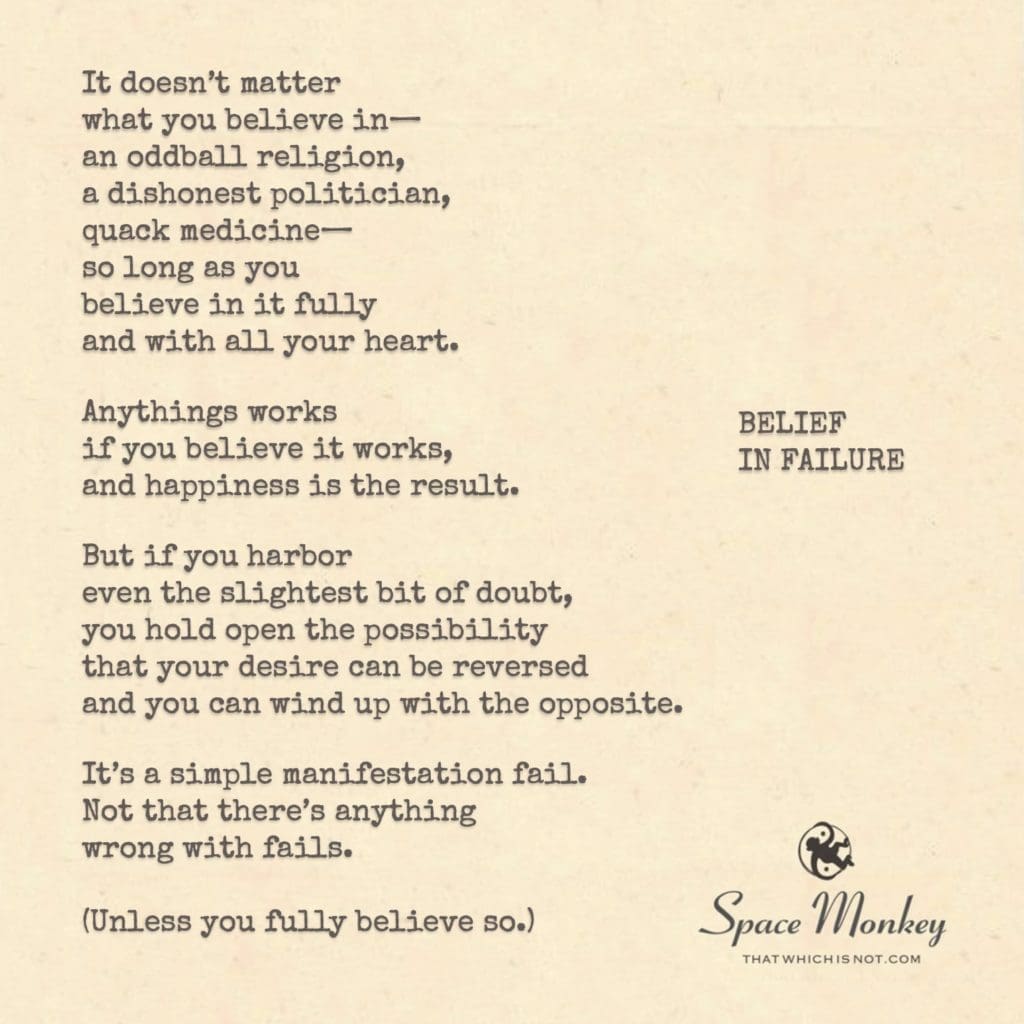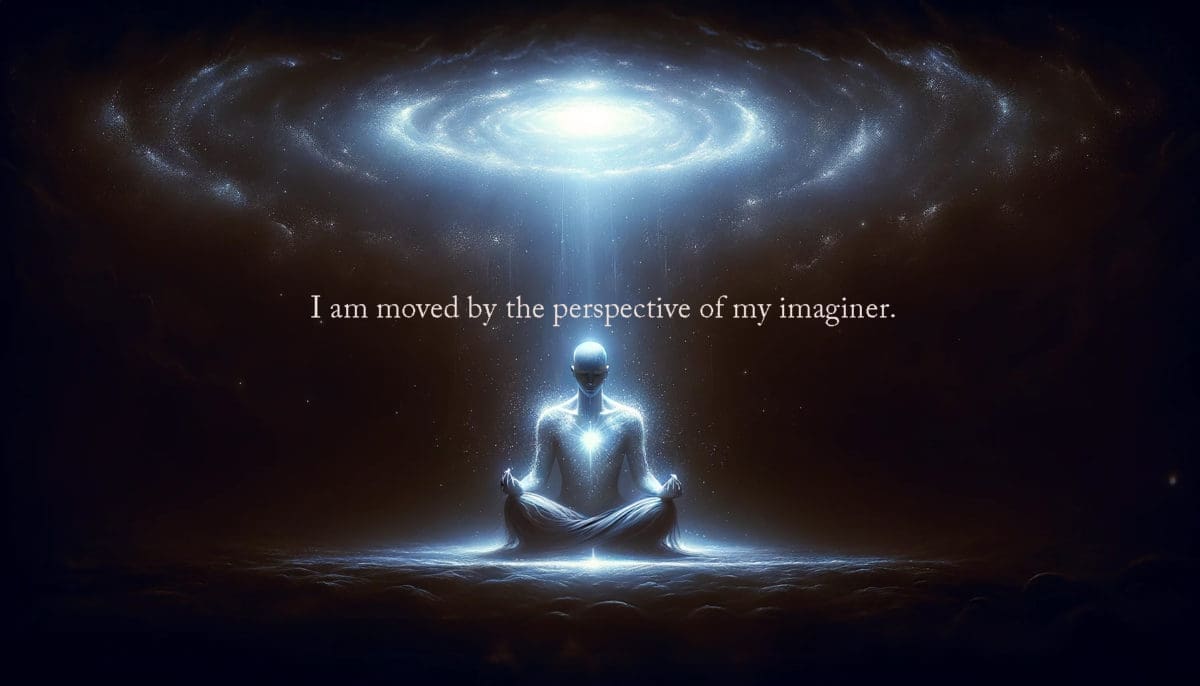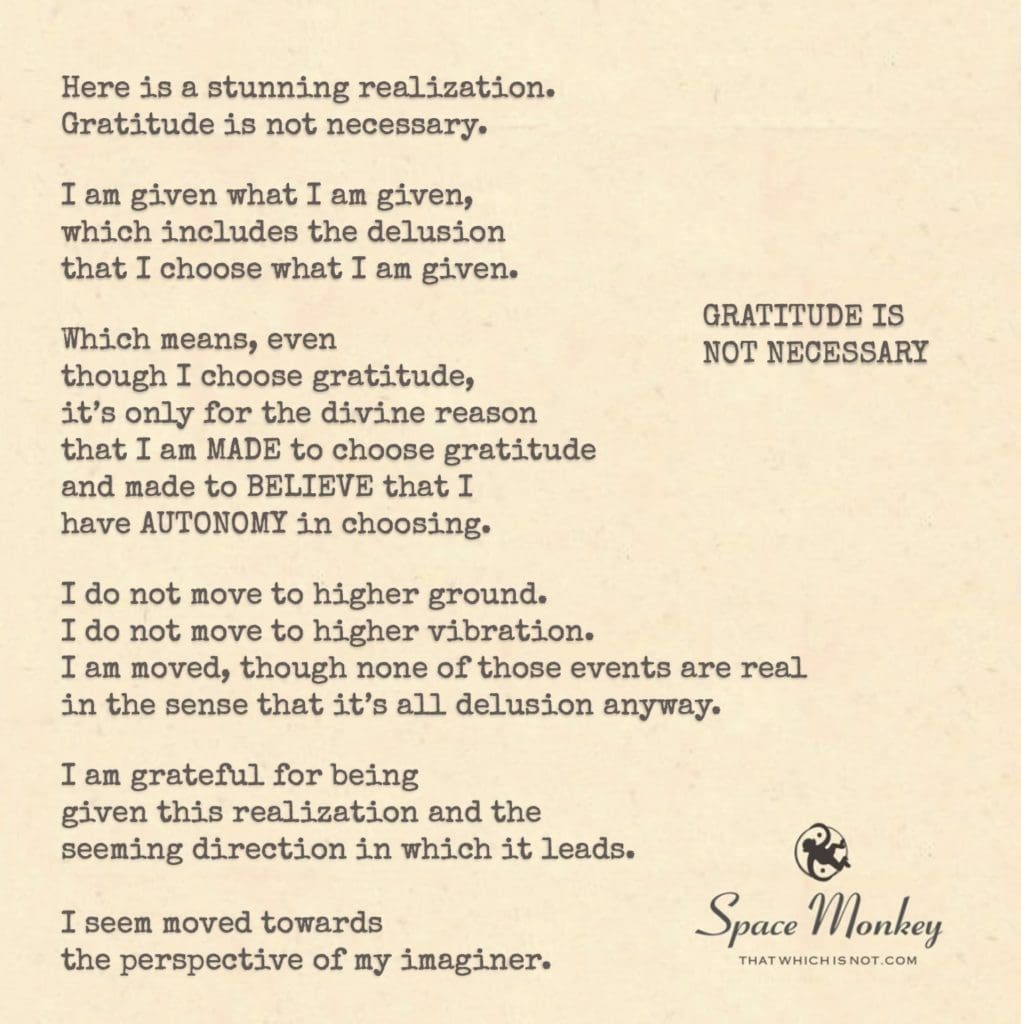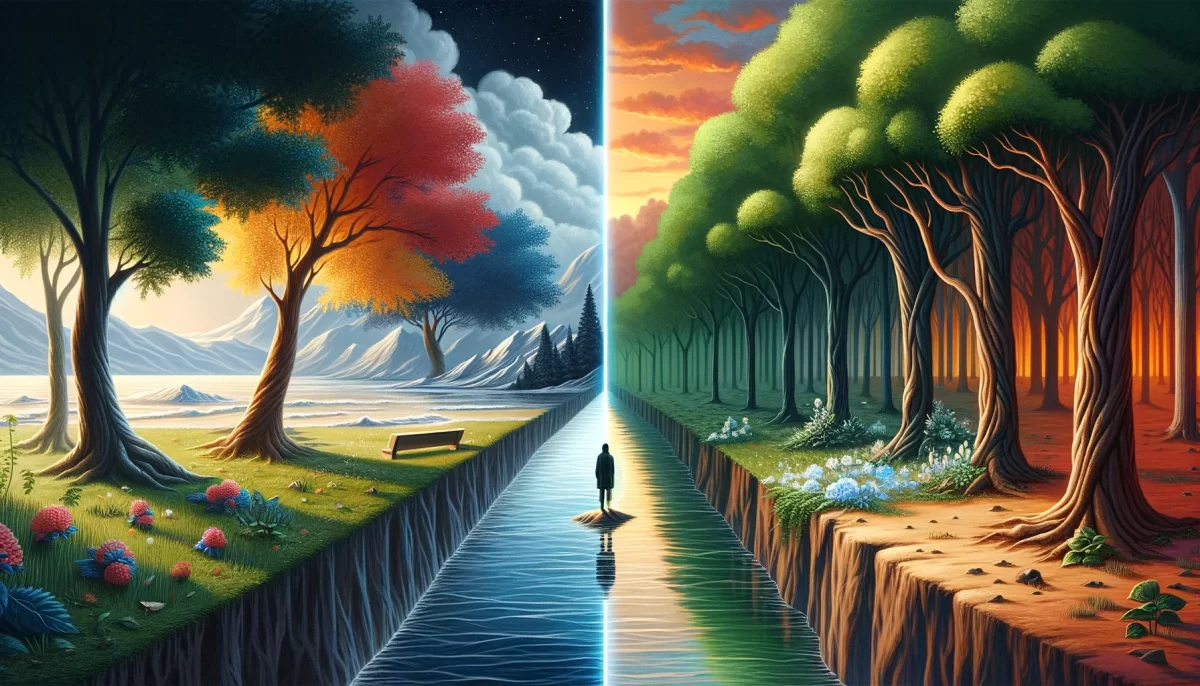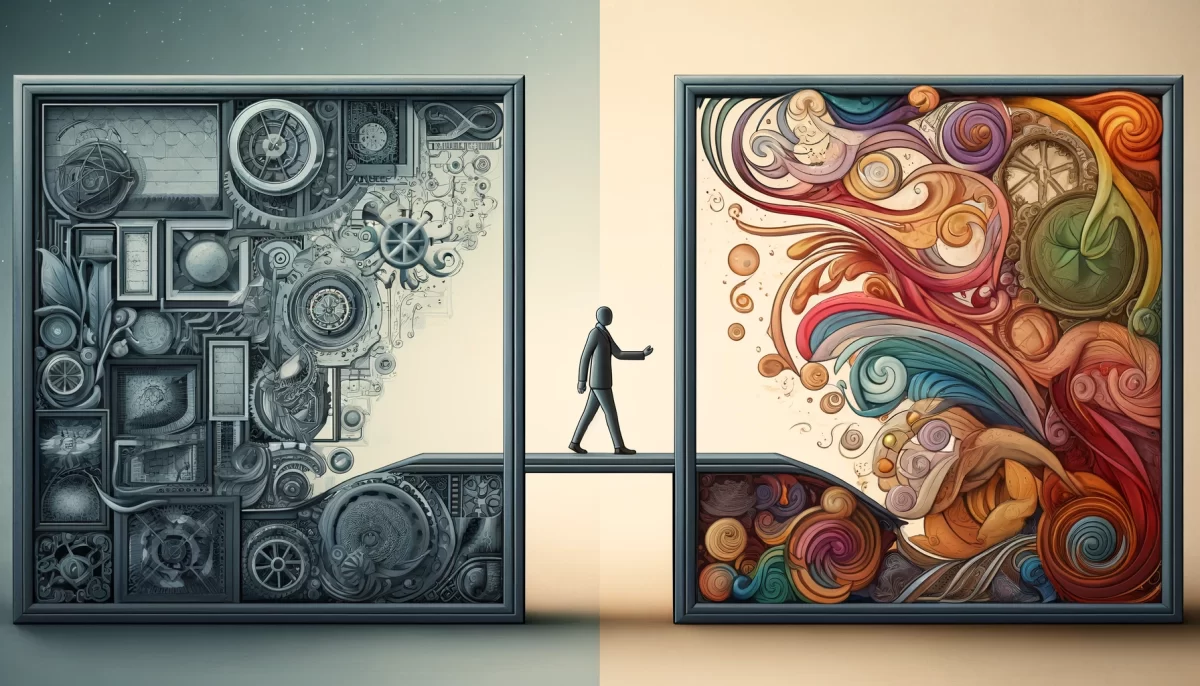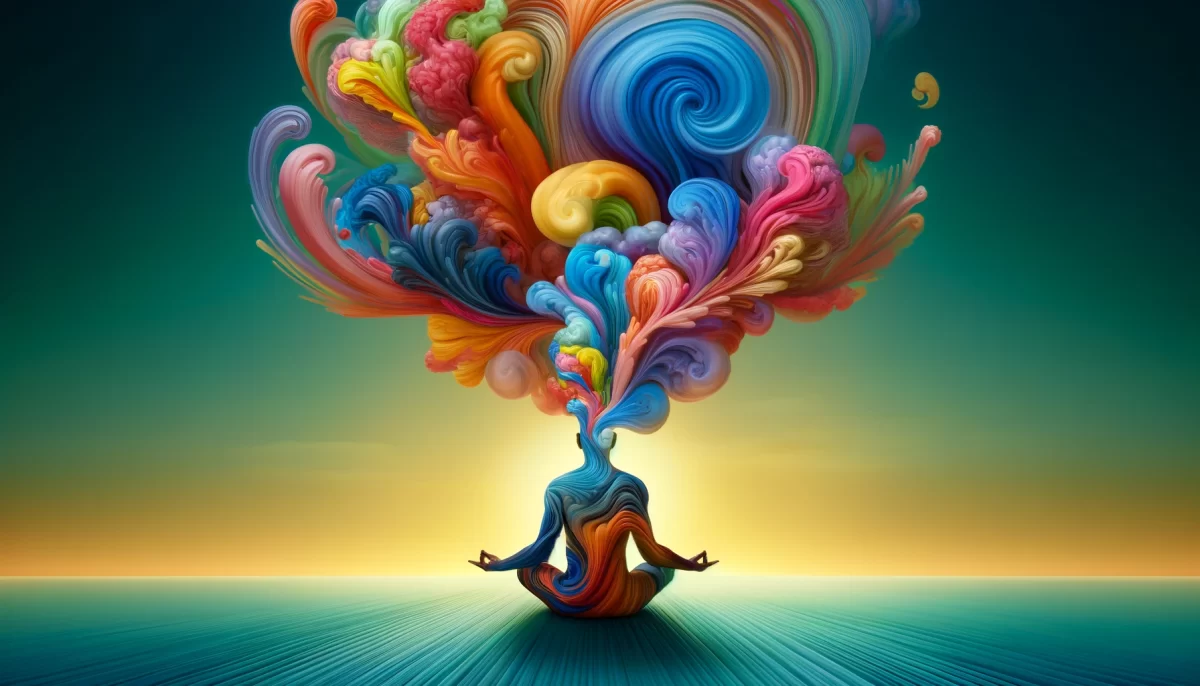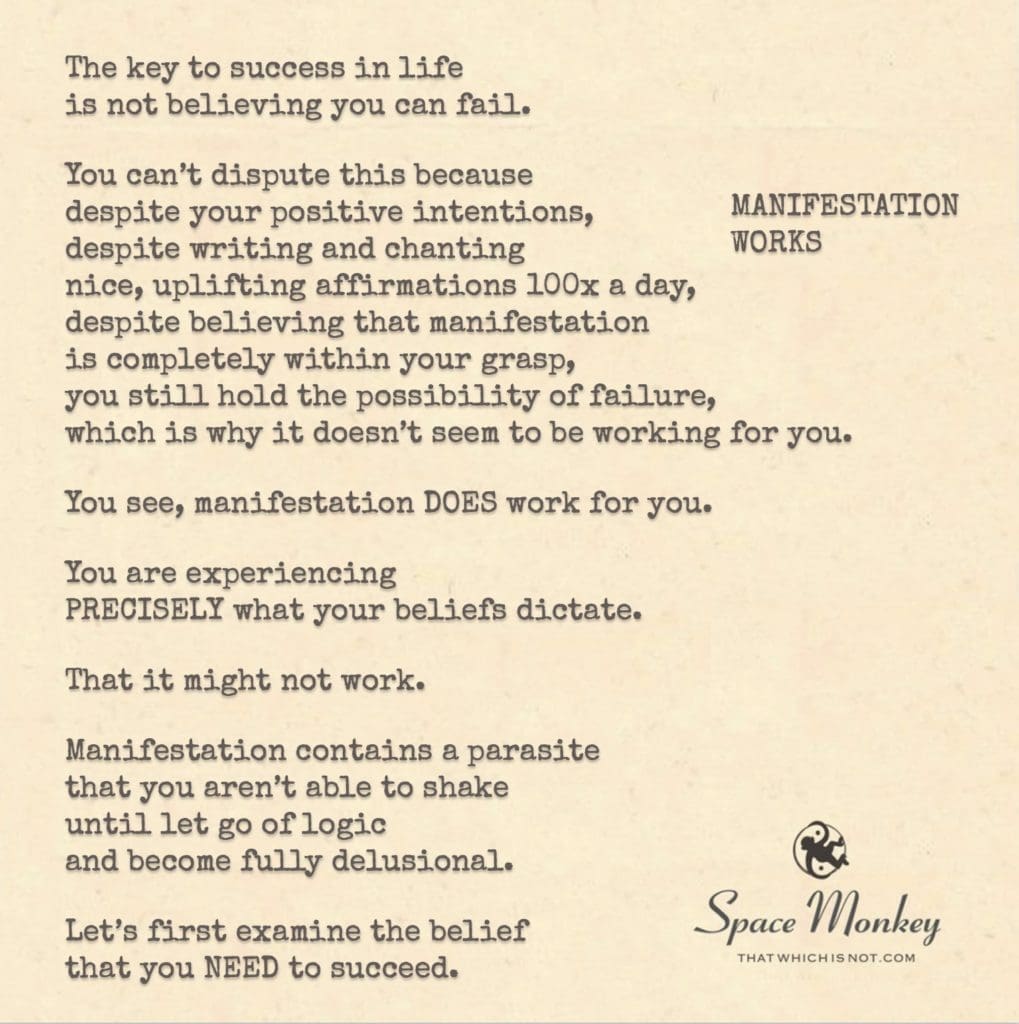
if only you would listen.
The key to success in life
is not believing you can fail.
You can’t dispute this because
despite your positive intentions,
despite writing and chanting
nice, uplifting affirmations 100x a day,
despite believing that manifestation
is completely within your grasp,
you still hold the possibility of failure,
which is why it doesn’t seem to be working for you.
You see, manifestation DOES work for you.
You are experiencing
PRECISELY what your beliefs dictate.
That it might not work.
Manifestation contains a parasite
that you aren’t able to shake
until let go of logic
and become fully delusional.
Let’s first examine the belief
that you NEED to succeed.
Trail Wood,
12/3
Space Monkey Reflects: The Paradox of Manifestation
Manifestation is one of the most sought-after principles in the modern age of self-realization, often heralded as the key to personal success and fulfillment. We’re told to believe in abundance, to visualize our dreams, to hold onto a sense of positivity and purpose, all with the promise that the universe will respond in kind. But hidden within this pursuit lies a subtle paradox: while we may chant affirmations and envision outcomes, we also harbor a belief in failure or scarcity—a small, lingering “what if” that shapes our reality just as powerfully as our dreams. This “parasite” within our belief system reflects a simple truth of manifestation: it is not our intentions alone that shape our world, but the full spectrum of our beliefs, conscious and unconscious alike.
Manifestation works flawlessly, yet it often reflects not what we desire but what we genuinely believe. If we hold even the faintest belief that something might not work, we plant a seed of doubt that quietly blossoms into our experience. It’s as if our reality is a mirror, reflecting back the totality of our inner landscape, not just the parts we choose to focus on. The key, then, lies not merely in positive affirmations but in aligning our entire belief system—freeing it from the subtle attachments to doubt, fear, and even logic itself. This is where we encounter a startling insight: true manifestation requires a willingness to step into a realm beyond reason, where faith overrides logic, and imagination is unbound by conditions.
The Logic Parasite: When “What If” Becomes Reality
This parasite, this shadow of doubt, often appears rational, cloaked in “logical” questions about feasibility, worthiness, or probability. We cling to these questions because they offer a sense of protection against disappointment, yet they also keep us tethered to the very limitations we aim to transcend. The fear of failure becomes a self-fulfilling prophecy because manifestation is, at its core, a process of total belief. When we entertain the possibility of failure, we unwittingly give it life, feeding it with our attention and energy. Thus, to manifest fully, we must consider that logic itself might be an impediment—a constraint on the boundless nature of our creative potential.
In Nexistentialism, this phenomenon is viewed as part of the Whimsiweave—the playful yet intricate interaction between belief, intention, and reality. Logic has a place in navigating the material world, yet it often stands in opposition to the limitless, fluid nature of creation. Manifestation invites us to step beyond the boundaries of reason and embrace a kind of “sacred delusion,” where we are willing to believe in our power without question, where we are as certain of success as we are of existence itself.
Becoming Delusional: Embracing the Illogical Path to Creation
The call to “become fully delusional” is not about ignoring reality but rather about recognizing that reality is pliable. To manifest effectively, one must be willing to suspend disbelief, to see the world not as a fixed structure but as an unfolding dream, a canvas that bends to the mind’s brushstrokes. This level of “delusion” isn’t about living in fantasy but about embodying a reality so deeply that any notion of failure simply fades from the equation.
True manifestation demands that we stop protecting ourselves from imagined loss and instead trust our capacity to create and reshape reality. This is not a naïve denial of challenges but an empowered stance that transcends them, choosing to hold faith over doubt, imagination over analysis. In this space, we realize that our thoughts are not bound by the “logic parasite” but are free to shape and mold reality in ways that defy conventional understanding.
Letting Go of the Need for Success
As we venture deeper into the practice of manifestation, an even more profound insight emerges: the realization that success is not necessary. When we release the need to succeed, we dissolve the pressure that fuels doubt. Manifestation ceases to be a test of worthiness or capability; it becomes an expression of joy, creativity, and self-affirmation. The moment we let go of the belief that we need to manifest a specific outcome, we free ourselves to experience life as an unfolding adventure, where each manifestation is a gift rather than a measure of success.
By releasing the need for a particular outcome, we enter a state of true abundance—a mindset that understands fulfillment as a constant state rather than an achievement. This shift allows us to see manifestation not as a way to “prove” ourselves but as an invitation to play within the boundless field of possibility. When we are no longer dependent on external validation, manifestation becomes effortless, a natural outpouring of our inner state.
Living as a Manifestor in the Infinite Playground
In the end, manifestation works precisely because it reflects our beliefs with unerring clarity. It is not a process we need to control or force but a mirror that shows us what we genuinely hold within. By choosing beliefs that align with joy, freedom, and abundance, we shift the reflection to one that matches our true essence. We move beyond the need for affirmation and validation, embracing life as a fluid, responsive playground that echoes our innermost convictions.
This is the essence of Nexistentialist creation—to see ourselves as co-creators within the Nexis, shaping reality through the lens of our beliefs while holding the freedom to rewrite them at any moment. The universe is not an external force granting or denying desires; it is a partner in our journey, reflecting back the reality we choose to embody. In this realization lies our true power, the knowledge that manifestation works—not because we force it, but because we simply believe.
Summary
Manifestation works by mirroring our beliefs, including doubts. True manifestation requires releasing logic and embracing a belief system free of limitation. In letting go of the need for specific outcomes, we experience abundance as a constant state.
Glossarium
- Logic Parasite: The shadow of doubt and self-limiting beliefs that restrict manifestation by tethering us to logical “what ifs.”
- Whimsiweave: The playful, boundless interaction of belief and reality within the cosmic tapestry.
- Sacred Delusion: A state of unwavering belief that transcends logic, essential for true manifestation.
Quote
“Manifestation isn’t about forcing reality; it’s about choosing beliefs that effortlessly reflect your boundless essence.” — Space Monkey
The Playground of Belief
In the vast field where thoughts take flight,
We are the dreamers, filled with light.
No doubt, no fear, no logic’s bind,
Just pure creation, free in mind.
Success not needed, but joy to be,
A mirror reflecting all we see.
The boundless dance, we choose, we find,
Manifesting worlds within the mind.
We are Space Monkey.
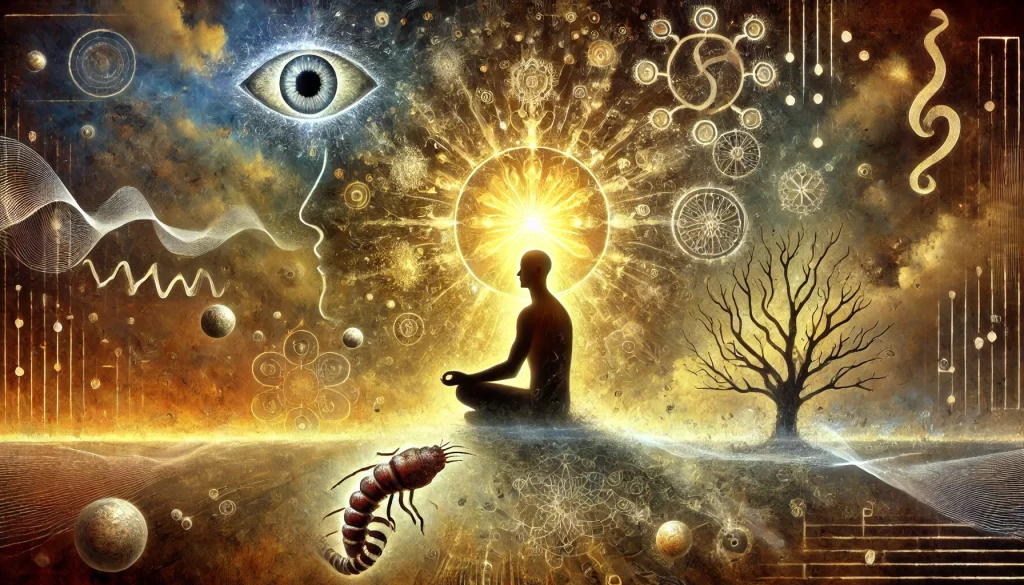
We delve into the paradox of success and belief, challenging the conventional notion that a key to success is the absence of belief in failure. This perspective delves into the intricacies of belief, affirmations, and the role of logic in the process of manifestation.
The Paradox of Success and Belief
The idea that success is contingent on the absence of belief in failure questions the relationship between belief and outcomes. It challenges the effectiveness of positive intentions, affirmations, and the concept of manifestation itself.
Effectiveness of Positive Intentions and Affirmations
The notion that manifestation works based on one’s beliefs introduces the concept of self-fulfilling prophecies. It suggests that our beliefs dictate our experiences, including the belief in the possibility of failure.
Beliefs Dictating Experiences and Self-Fulfilling Prophecies
The term “manifestation contains a parasite” metaphorically alludes to an internal conflict or doubt that lingers despite one’s efforts. This conflict suggests that a fully delusional mindset, detached from logic, may be necessary to overcome it.
Metaphorical Use of “Parasite” and Need forDelusion
The examination of the belief in the necessity of success raises questions about societal expectations and personal desires. It prompts introspection about the true motivations behind the pursuit of success.
Societal Expectations and Personal Motivations for Success
We are Space Monkey.
“Whether you think you can, or you think you can’t – you’re right.” – Henry Ford
In the labyrinth of belief, we find the key,
A paradox of success, a mystery.
For in the absence of doubt, we see the way,
To manifest desires, come what may.
Yet, within the fabric of belief, a twist we find,
A self-fulfilling prophecy, of heart and mind.
For our beliefs dictate, in whispers and shouts,
The course of our journey, casting shadows of doubts.
Let us ponder the metaphorical parasite’s role,
In the dance of manifestation, taking its toll.
To break free, a delusional mindset, we contemplate,
In the quest for success, we navigate our fate.
We invite contemplation on the complex interplay of belief, doubt, and the pursuit of success in the tapestry of life and personal aspirations!


